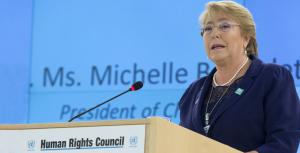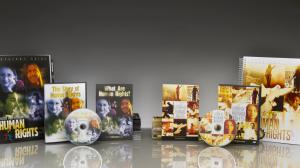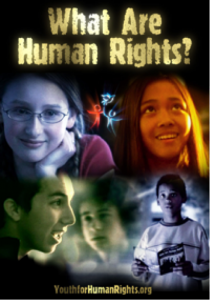The importance of human rights education in times of crisis. Why it matters

A need to protect human rights during the COVID-19 pandemic raised by UN High Commissioner for Human Rights Michelle Bachelet at a recent online event (Photo Courtesy of UN NEWS)
UN High Commissioner for Human Rights Michelle Bachelet speaks on protecting human rights while implementing effective public health policies.
The stated purpose of the United Nations is to bring peace to all nations of the world. After World War II, a committee headed by Mrs. Eleanor Roosevelt, the wife of US President Franklin D. Roosevelt, made a “declaration” of the rights that everyone in the world should have—the Universal Declaration of Human Rights (UDHR). Today there are 192 member states of the UN, all of whom have signed on in agreement with the Universal Declaration of Human Rights.
“It looked like we needed the First and the Second World Wars to sort of identify which were the basic values of living together as human beings that we needed. That is why the Universal Declaration (of Human Rights) is so universal.…I hope that something like that can happen to us. That after this pandemic, when we are trying to think how we build a better world? How do we shape the world in a better way,” said Bachelet in a recent event with The Dialogue. The Dialogue also known as The Inter-American Dialogue engages a network of global leaders to foster democratic governance, prosperity, and social equity in Latin America and the Caribbean.
Bachelet warned of the threat to civil liberties and human rights posed by governments that use the COVID-19 emergency as cover to concentrate power or introduce repressive policies. She also spoke about how in places like Latin America the impact to human rights violation will be worse on women and vulnerable groups such as migrants, prisoners, and the poor. Current quarantine global policies and stay-at-home orders have the potential to be abused by governments if their citizens do not keep their governments in check. How can individuals ensure the protection of their human rights without a clear understanding of what they are?
Erica Rodgers, Director of Youth for Human Rights National Office, who participated in the event, commented, “If society is to build a better world, protecting the human rights of all will be a huge part of that. That protection starts with education and understanding of human rights. Protecting the human rights of workers, minorities and addressing discrimination issues will be key. Our new normal coming out of this pandemic should be a greater respect for human rights and a greater demand to our governments not to infringe upon our rights but to stand to protect the rights for all."
The message in UDHR’s preamble is clear that "every individual and every organ of society” is to "strive by teaching and education to promote respect for these rights and freedoms."
Youth for Human Rights continues to reach out around the country by offering free online courses and materials through its education package making UDHR’s 30 human rights clearly understood. It is vital that not only youth be educated but parents and all citizens as well.
Included in each free education package are the following human rights action tools:
1. The Youth for Human Rights Educator’s Guide - contains lesson plans, enrichment activities, ideas for activating the students on human rights education and a list of specific correlations of the lessons to model education standards. This is a resource for implementing a complete human rights curriculum in your class or school, or can be integrated into an existing curriculum.
2. The Story of Human Rights - a powerful and compelling documentary film that defines human rights by telling the dramatic story of their history and development from earliest times to the present day. It is suitable for all ages and is available in 26 languages.
3. Public Service Announcements (PSAs) – they depict each of the 30 Articles of the United Nations Universal Declaration of Human Rights. These individual videos portray in real-life terms what each one of the 30 human rights is. They have been airing on TV, in movie theaters and sports stadiums all over the world. They are translated in 17 languages.
4. UNITED music video - a winner of more than a dozen international awards—including “Best Short Film” at the New York International Independent Film Festival. This five-minute, street-savvy, multi-ethnic video gives a human rights message and advocates nonviolence, and is available in 17 languages.
5. The "What Are Human Rights?" booklet - contains a fully illustrated, youth version of the United Nations Universal Declaration of Human Rights that makes human rights understandable for young people. It is available in packages of 24 booklets
6. A set of 30 posters - highlighting each one the 30 human rights to help reinforce human rights education in schools or community centers.
7. Glossary of terms, references to print and online resources.
These are tools that can empower any youth or educator to bring human rights to life for young people through education. If you are an educator, request your free Education Package.
You can watch the full interview with UN High Commissioner for Human Rights Michelle Bachelet and The Dialogue by going here: https://www.thedialogue.org/events/online-event-covid-19-and-human-rights-in-latin-america-a-conversation-with-michelle-bachelet/
About Youth for Human Rights:
Youth for Human Rights International, a non-profit organization committed to educating people worldwide on their human rights and accompanying responsibilities through the United Nations Universal Declaration of Human Rights, assisting and enabling young people to become leaders, advocating for tolerance and peace. While many other global human rights organizations focus on raising concerns about human rights violations, advancing research and advocating on behalf of the victims of abuse, Youth for Human Rights International complements this work by addressing those issues with educational materials and activities. At the core of its campaign are the informational “What Are Human Rights?” booklets, introducing youth and adults to the 30 rights in the Universal Declaration of Human Rights, illustrated in simple and clear language. They are provided free of charge to millions of people annually and made available in 27 languages at https://www.youthforhumanrights.org/request-info/free-portfolio.html
To learn more about Youth for Human Rights International go to https://www.youthforhumanrights.org or watch
https://www.scientology.tv/series/voices-for-humanity/mary-shuttleworth.html
Press Office
Youth for Human Rights International - National Office
+1 202-667-6404
email us here
Legal Disclaimer:
EIN Presswire provides this news content "as is" without warranty of any kind. We do not accept any responsibility or liability for the accuracy, content, images, videos, licenses, completeness, legality, or reliability of the information contained in this article. If you have any complaints or copyright issues related to this article, kindly contact the author above.


